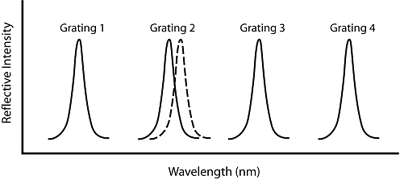|
Cardiovascular events remain largely unpredictable. However, recently,
inflammation has been recognized as being associated with the formation
and progression of vulnerable plaque. It has been observed that the
inflamed necrotic core of a vulnerable plaque deposit is a fraction of a
degree to a few degrees higher than the surrounding tissue.
MSI is developing an optical thermal mapping technology for real-time
temperature monitoring of a vessel wall, with high sensitivity,
accuracy, and ease of use.
The technology is based on hair-thin optical fibers, encoded with
optical gratings derived from state-of-the-art optical fiber
communication. Fiber gratings reflect light of particular bandwidths and
can act as high-performance optical thermal sensors. The reflected
bandwidths are extremely narrow. A minute temperature change around the
fibers, changes the effective refractive index, and leads to modulation
of reflective wavelengths. The OTMC incorporates multiple optical fibers
into a basket catheter that can simultaneously map thermal distribution
in-situ.

At present the small plaques that coronary angiography judges as
"non-significant” appear to be the source of many heart attacks. It
appears that inflammation within the plaques causes them to
rupture.
MSI’s developing technology offers a real-time opportunity to track
temperature changes related to inflammation, changes which may forecast the imminent rupture of plaques and subsequent
closing off of coronary arteries.
MSI is currently developing an optical thermal mapping catheter (OTMC)
that operates in-situ, transmitting minute temperature changes in
artery walls.
Contact Maxwell Sensors to learn more about optical thermal
mapping technology and associated products.
Top |